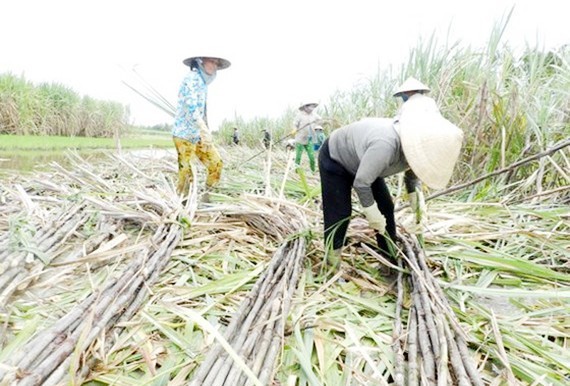
The wholesale price of sugar in the market has inched up and is waiting for the next move when the Ministry of Industry and Trade (MoIT) has launched investigations to apply anti-dumping and anti-subsidy measures to some cane sugar products originating from Thailand.
Sugar refineries hope that the wholesale price of sugar can increase. However, the growing-area of raw material sugarcane in the Mekong Delta can hardly survive to supply sugarcane for them when farmers have simultaneously given up on sugarcane.
Growing the same crop, but farmers in Phung Hiep District in Hau Giang Province sell sugarcane at two different prices. Sugarcane sold to traders buying sugarcane for juice is priced from VND1,000 to VND1,500 per kilogram, while sugarcane sold to Phung Hiep Sugar Refinery is only from VND780 to VND1,000 per kilogram.
Huynh Van Cuong, a farmer in Phung Hiep District, said that his family had just sold 9,000 square meters of sugarcane at the price of VND1,400 per kilogram to traders who buy sugarcane for juice and earned a profit of over VND600 per kilogram. This price level is considered as the highest in the past five years.
Phung Hiep is the district with the largest sugarcane growing area in the Mekong Delta. The district is located in the lowland, so a part of the sugarcane growing area is often flooded from late September to November every year. After the water recedes, sugarcanes lose commercial cane sugar, so farmers sell them to the refineries for about VND780 per kilogram, equal to the production cost.
Last year, due to a shortage of raw materials, Vi Thanh Sugar Refinery was temporarily closed. Only Phung Hiep Sugar Refinery remains active, but the shortage of raw material sugarcane is severe. At the beginning of this crop, the plant had to halt operation after operating for a few days to wait for a sufficient supply of raw material sugarcane, said Mr. Tran Chi Hung, Director of Department of Agriculture and Rural Development of Hau Giang Province.
According to Mr. Hung, Hau Giang has zoned again the growing area of raw material sugarcane with the embankment. Of which, farmers will actively sell to sugarcane-juice traders and supply to sugar refineries.
When the sugar prices were high, refineries flocked to Phung Hiep District, vying each other to buy raw material sugarcane. During its heyday, Phung Hiep had 10,000 hectares of sugarcane, but the area of sugarcane is now only at about 4,500 hectares. Similarly, during the peak time, the Mekong Delta had around 100,000 hectares of sugarcane, and now it remains only more than 10,000 hectares. Accordingly, from ten active sugar refineries, now only three refineries are running in moderation.
This is the year that farmers in Phung Hiep District have sold the largest volume of sugarcane to sugarcane-juice traders, with 2,000 hectares, accounting for nearly half of the total sugarcane growing area of the district, said Mr. Tran Van Tuan, Head of the Department of Agriculture and Rural Development of Phung Hiep District.
It may be an unexpected arising issue for Phung Hiep Sugar Refinery - one of the plants still operating in the Mekong Delta (the two other plants, namely Tra Vinh and Soc Trang, are expected to resume operation after the Lunar New Year).
Domestic sugar prices have edged up in the past two months. Specifically, the wholesale price of sugar is at VND14,000 per kilogram; the selling price of sugar at markets and supermarkets is at VND15,000-VND18,000 per kilogram, an increase of nearly VND2,000 per kilogram. However, the fact that the growing area of raw material sugarcane in the Mekong Delta will continue to decrease is unavoidable when the buying prices of raw material sugarcane of the last sugar refineries are equal to the production costs. Perhaps, the sugarcane area will only remain a piece of memories of Mekong Delta people who like to drink sugarcane juice from sugarcane juicers.
Sugar refineries hope that the wholesale price of sugar can increase. However, the growing-area of raw material sugarcane in the Mekong Delta can hardly survive to supply sugarcane for them when farmers have simultaneously given up on sugarcane.
Growing the same crop, but farmers in Phung Hiep District in Hau Giang Province sell sugarcane at two different prices. Sugarcane sold to traders buying sugarcane for juice is priced from VND1,000 to VND1,500 per kilogram, while sugarcane sold to Phung Hiep Sugar Refinery is only from VND780 to VND1,000 per kilogram.
Huynh Van Cuong, a farmer in Phung Hiep District, said that his family had just sold 9,000 square meters of sugarcane at the price of VND1,400 per kilogram to traders who buy sugarcane for juice and earned a profit of over VND600 per kilogram. This price level is considered as the highest in the past five years.
Phung Hiep is the district with the largest sugarcane growing area in the Mekong Delta. The district is located in the lowland, so a part of the sugarcane growing area is often flooded from late September to November every year. After the water recedes, sugarcanes lose commercial cane sugar, so farmers sell them to the refineries for about VND780 per kilogram, equal to the production cost.
Last year, due to a shortage of raw materials, Vi Thanh Sugar Refinery was temporarily closed. Only Phung Hiep Sugar Refinery remains active, but the shortage of raw material sugarcane is severe. At the beginning of this crop, the plant had to halt operation after operating for a few days to wait for a sufficient supply of raw material sugarcane, said Mr. Tran Chi Hung, Director of Department of Agriculture and Rural Development of Hau Giang Province.
According to Mr. Hung, Hau Giang has zoned again the growing area of raw material sugarcane with the embankment. Of which, farmers will actively sell to sugarcane-juice traders and supply to sugar refineries.
When the sugar prices were high, refineries flocked to Phung Hiep District, vying each other to buy raw material sugarcane. During its heyday, Phung Hiep had 10,000 hectares of sugarcane, but the area of sugarcane is now only at about 4,500 hectares. Similarly, during the peak time, the Mekong Delta had around 100,000 hectares of sugarcane, and now it remains only more than 10,000 hectares. Accordingly, from ten active sugar refineries, now only three refineries are running in moderation.
This is the year that farmers in Phung Hiep District have sold the largest volume of sugarcane to sugarcane-juice traders, with 2,000 hectares, accounting for nearly half of the total sugarcane growing area of the district, said Mr. Tran Van Tuan, Head of the Department of Agriculture and Rural Development of Phung Hiep District.
It may be an unexpected arising issue for Phung Hiep Sugar Refinery - one of the plants still operating in the Mekong Delta (the two other plants, namely Tra Vinh and Soc Trang, are expected to resume operation after the Lunar New Year).
Domestic sugar prices have edged up in the past two months. Specifically, the wholesale price of sugar is at VND14,000 per kilogram; the selling price of sugar at markets and supermarkets is at VND15,000-VND18,000 per kilogram, an increase of nearly VND2,000 per kilogram. However, the fact that the growing area of raw material sugarcane in the Mekong Delta will continue to decrease is unavoidable when the buying prices of raw material sugarcane of the last sugar refineries are equal to the production costs. Perhaps, the sugarcane area will only remain a piece of memories of Mekong Delta people who like to drink sugarcane juice from sugarcane juicers.
























